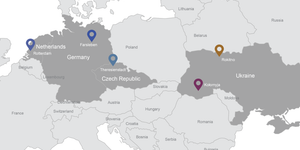Liberating Our Stories
Liberating Our Stories
The five survivors’ stories presented here are firsthand accounts of their different moments of liberation. A hidden child is greeted by Canadian troops in the Netherlands. A boy joins his Soviet liberators in the war effort after over a year hiding in the forests of Ukraine and Eastern Poland. A twelve-year-old boy who witnessed the despair of the Warsaw ghetto and the terrors of multiple concentration camps is freed by Soviet soldiers. An inmate of the Bergen-Belsen concentration camp is rescued from a train by American troops. And a girl lying in a ditch on the side of the road tries to attract the attention of soldiers after leaving the cramped hiding place she shared with nine other people.
But for many, freedom from the Nazi occupation did not mean they felt completely free from suffering. Survivors often had difficulty leaving their painful pasts behind them, and some remained silent about what they had experienced.
And yet their moments of liberation were the beginning of another story. As they restarted their lives after the war, these five survivors gained a new sense of freedom through opening up about what they experienced. Even though it may have been difficult, this process was a way to express their feelings of loss, honour their rescuers and liberators and to find a way to heal. It was their second liberation.
Explore the diverse stories of five Holocaust survivors and their different liberation journeys, as told in their memoirs:
Claire Baum: The Hidden Package
Pinchas Gutter: Memories in Focus
Alex Levin: Under the Yellow & Red Stars
Leslie Meisels: Suddenly the Shadow Fell
Rachel Shtibel: The Violin
In telling these stories, the writers have liberated themselves.


